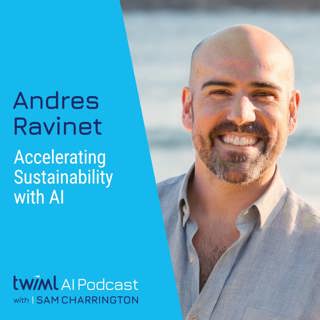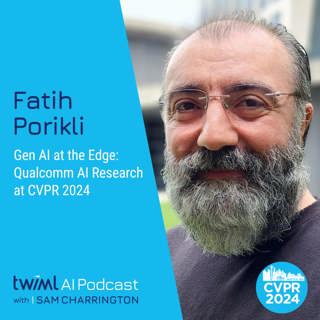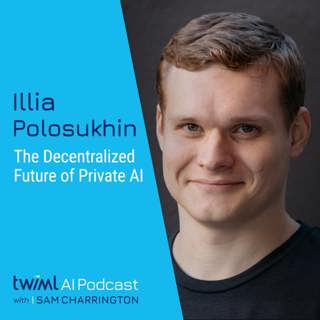
Building Real-World LLM Products with Fine-Tuning and More with Hamel Husain - #694
Today, we're joined by Hamel Husain, founder of Parlance Labs, to discuss the ins and outs of building real-world products using large language models (LLMs). We kick things off discussing novel applications of LLMs and how to think about modern AI user experiences. We then dig into the key challenge faced by LLM developers—how to iterate from a snazzy demo or proof-of-concept to a working LLM-based application. We discuss the pros, cons, and role of fine-tuning LLMs and dig into when to use this technique. We cover the fine-tuning process, common pitfalls in evaluation—such as relying too heavily on generic tools and missing the nuances of specific use cases, open-source LLM fine-tuning tools like Axolotl, the use of LoRA adapters, and more. Hamel also shares insights on model optimization and inference frameworks and how developers should approach these tools. Finally, we dig into how to use systematic evaluation techniques to guide the improvement of your LLM application, the importance of data generation and curation, and the parallels to traditional software engineering practices. The complete show notes for this episode can be found at https://twimlai.com/go/694.
23 Juli 20241h 20min

Mamba, Mamba-2 and Post-Transformer Architectures for Generative AI with Albert Gu - #693
Today, we're joined by Albert Gu, assistant professor at Carnegie Mellon University, to discuss his research on post-transformer architectures for multi-modal foundation models, with a focus on state-space models in general and Albert’s recent Mamba and Mamba-2 papers in particular. We dig into the efficiency of the attention mechanism and its limitations in handling high-resolution perceptual modalities, and the strengths and weaknesses of transformer architectures relative to alternatives for various tasks. We dig into the role of tokenization and patching in transformer pipelines, emphasizing how abstraction and semantic relationships between tokens underpin the model's effectiveness, and explore how this relates to the debate between handcrafted pipelines versus end-to-end architectures in machine learning. Additionally, we touch on the evolving landscape of hybrid models which incorporate elements of attention and state, the significance of state update mechanisms in model adaptability and learning efficiency, and the contribution and adoption of state-space models like Mamba and Mamba-2 in academia and industry. Lastly, Albert shares his vision for advancing foundation models across diverse modalities and applications. The complete show notes for this episode can be found at https://twimlai.com/go/693.
17 Juli 202457min

Decoding Animal Behavior to Train Robots with EgoPet with Amir Bar - #692
Today, we're joined by Amir Bar, a PhD candidate at Tel Aviv University and UC Berkeley to discuss his research on visual-based learning, including his recent paper, “EgoPet: Egomotion and Interaction Data from an Animal’s Perspective.” Amir shares his research projects focused on self-supervised object detection and analogy reasoning for general computer vision tasks. We also discuss the current limitations of caption-based datasets in model training, the ‘learning problem’ in robotics, and the gap between the capabilities of animals and AI systems. Amir introduces ‘EgoPet,’ a dataset and benchmark tasks which allow motion and interaction data from an animal's perspective to be incorporated into machine learning models for robotic planning and proprioception. We explore the dataset collection process, comparisons with existing datasets and benchmark tasks, the findings on the model performance trained on EgoPet, and the potential of directly training robot policies that mimic animal behavior. The complete show notes for this episode can be found at https://twimlai.com/go/692.
9 Juli 202443min

How Microsoft Scales Testing and Safety for Generative AI with Sarah Bird - #691
Today, we're joined by Sarah Bird, chief product officer of responsible AI at Microsoft. We discuss the testing and evaluation techniques Microsoft applies to ensure safe deployment and use of generative AI, large language models, and image generation. In our conversation, we explore the unique risks and challenges presented by generative AI, the balance between fairness and security concerns, the application of adaptive and layered defense strategies for rapid response to unforeseen AI behaviors, the importance of automated AI safety testing and evaluation alongside human judgment, and the implementation of red teaming and governance. Sarah also shares learnings from Microsoft's ‘Tay’ and ‘Bing Chat’ incidents along with her thoughts on the rapidly evolving GenAI landscape. The complete show notes for this episode can be found at https://twimlai.com/go/691.
1 Juli 202457min

Long Context Language Models and their Biological Applications with Eric Nguyen - #690
Today, we're joined by Eric Nguyen, PhD student at Stanford University. In our conversation, we explore his research on long context foundation models and their application to biology particularly Hyena, and its evolution into Hyena DNA and Evo models. We discuss Hyena, a convolutional-based language model developed to tackle the challenges posed by long context lengths in language modeling. We dig into the limitations of transformers in dealing with longer sequences, the motivation for using convolutional models over transformers, its model training and architecture, the role of FFT in computational optimizations, and model explainability in long-sequence convolutions. We also talked about Hyena DNA, a genomic foundation model pre-trained on 1 million tokens, designed to capture long-range dependencies in DNA sequences. Finally, Eric introduces Evo, a 7 billion parameter hybrid model integrating attention layers with Hyena DNA's convolutional framework. We cover generating and designing DNA with language models, hallucinations in DNA models, evaluation benchmarks, the trade-offs between state-of-the-art models, zero-shot versus a few-shot performance, and the exciting potential in areas like CRISPR-Cas gene editing. The complete show notes for this episode can be found at https://twimlai.com/go/690.
25 Juni 202445min

Accelerating Sustainability with AI with Andres Ravinet - #689
Today, we're joined by Andres Ravinet, sustainability global black belt at Microsoft, to discuss the role of AI in sustainability. We explore real-world use cases where AI-driven solutions are leveraged to help tackle environmental and societal challenges, from early warning systems for extreme weather events to reducing food waste along the supply chain to conserving the Amazon rainforest. We cover the major threats that sustainability aims to address, the complexities in standardized sustainability compliance reporting, and the factors driving businesses to take a step toward sustainable practices. Lastly, Andres addresses the ways LLMs and generative AI can be applied towards the challenges of sustainability. The complete show notes for this episode can be found at https://twimlai.com/go/689.
18 Juni 202447min

Gen AI at the Edge: Qualcomm AI Research at CVPR 2024 with Fatih Porikli - #688
Today we’re joined by Fatih Porikli, senior director of technology at Qualcomm AI Research. In our conversation, we covered several of the Qualcomm team’s 16 accepted main track and workshop papers at this year’s CVPR conference. The papers span a variety of generative AI and traditional computer vision topics, with an emphasis on increased training and inference efficiency for mobile and edge deployment. We explore efficient diffusion models for text-to-image generation, grounded reasoning in videos using language models, real-time on-device 360° image generation for video portrait relighting, unique video-language model for situated interactions like fitness coaching, and visual reasoning model and benchmark for interpreting complex mathematical plots, and more! We also touched on several of the demos the team will be presenting at the conference, including multi-modal vision-language models (LLaVA) and parameter-efficient fine tuning (LoRA) on mobile phones. The complete show notes for this episode can be found at https://twimlai.com/go/688.
10 Juni 20241h 10min

Energy Star Ratings for AI Models with Sasha Luccioni - #687
Today, we're joined by Sasha Luccioni, AI and Climate lead at Hugging Face, to discuss the environmental impact of AI models. We dig into her recent research into the relative energy consumption of general purpose pre-trained models vs. task-specific, non-generative models for common AI tasks. We discuss the implications of the significant difference in efficiency and power consumption between the two types of models. Finally, we explore the complexities of energy efficiency and performance benchmarking, and talk through Sasha’s recent initiative, Energy Star Ratings for AI Models, a rating system designed to help AI users select and deploy models based on their energy efficiency. The complete show notes for this episode can be found at http://twimlai.com/go/687.
3 Juni 202448min






















